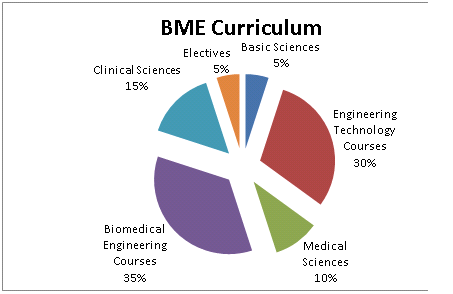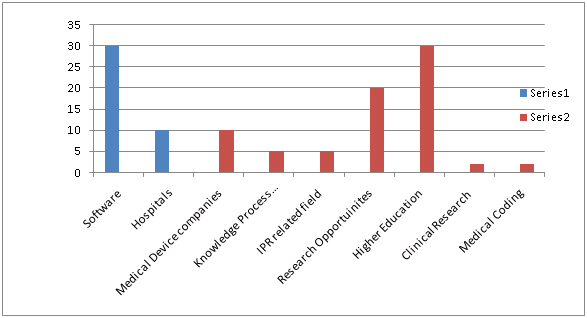About Us
DEPARTMENT OF BIOMEDICAL ENGINEERING
Phone: 8331040962, Website: http://www.uceou.edu/bme/bme.html
Biomedical Engineering (BME) constitutes human beings earliest efforts to understand the living world in terms of the basic sciences and to comprehend the body mechanism in terms of their technological creations. Biomedical Engineering involves the study and application of engineering processes for diagnosis and therapy. It is a rapidly changing interdisciplinary domain, in which each branch of engineering interacts with a number of other disciplines to yield a fundamental understanding of health maintenance processes and improved diagnosis, optimal interventional (surgical, therapeutic & rehabilitative) procedures, prosthesis and organ assist systems, health care systems performance and econometrics.
Osmania University is the first University to start Biomedical Engineering at undergraduate level in the country. The course was started in the year 1982 with an intake of 10 students in the Department of Electronics and Communications Engineering. An exclusive Biomedical Engineering Department was formed in the year 1993 to give the much needed thrust to Programme. The student intake was enhanced to 30 in the year 1996.The Department moved to its present premises in the year 1997.
The Department has been engaged in research and consultancy projects. It received research grants from various government agencies such as AICTE; UGC, DST, TEQIP (Phase I & II) etc., The Department established a Biomedical Instrumentation centre (BMIC) to cater to the needs of medical profession. The B.E (BME) programme of the department has been accredited by the NBA for the five years with effect from August 2013. A special appreciation was given by the visiting expert team. The faculty members of the department are also active, effective and acknowledged contributors to UPE project of the UGC. The Department has also started Post Graduate program in Biomedical Electronics in the academic year 2006-2007. The total floor space of 10800 sft. houses class rooms, laboratories and other amenities.
Academic Programs:
S.No |
Program |
Intake |
Mode of Admission | Commencement of the program | Accreditation Status |
| 1 | B.E. (Biomedical Engineering) |
30+10*+4*
(*Bi.P.C **Lateral Entry) |
30 from TSEAMCET M.P.C online counseling+10 from TSEAMCET Bi.P.C online counseling+4 from TSECET online counseling |
1982 |
Accredited by NBA for 6 years w.e.f 2019-25 |
| 2 | M.E. (MEDICAL DEVICES) |
18 |
Through GATE in BM/EC/EIE/BT & TSPGECET online Counseling |
2006 |
------- |
| 3 | Ph.D. (Biomedical Engineering) |
6 (awarded) 13 (in progress) |
Through JRF under Category-I & OUPHD Entrance examination |
1996 | ------- |
VISION :
To coherently work with medical professionals in providing effective and affordable healthcare
MISSION :
M1 To produce biomedical engineering graduates who can understand and apply basic engineering principles to solve the problems of the medical field.
M2 To develop biomedical engineers to conceive innovative strategies for designing and developing medical equipment, implants, and other devices of immense use to the society.
PROGRAM EDUCATIONAL OBJECTIVES :
| PEO1 | Exhibit strong skills in problem solving, leadership, teamwork and enterprise management. |
| PEO2 | Be able to effectively communicate with healthcare professionals to know their problems and provide effective solutions. |
| PEO3 | Use the skills to contribute to the scientific and engineering needs of the society in general and the Biomedical field in particular. |
| PEO4 | Pursue research degrees and practice technical competency as professionals in Biomedical Engineering or allied fields. |
| PEO5 | Sustain professional development in their fields and advance to positions of greater responsibility with life-long learning. |
B.E. PROGRAM OUTCOMES/PROGRAM SPECIFIC OUTCOMES
| PO1 | Engineering knowledge: Apply the knowledge of mathematics, science, engineering fundamentals, and an engineering specialization to the solution of complex engineering problems. |
| PO2 | Problem Analysis: Identify, formulate, review research literature, and analyze complex engineering problems reaching substantiated conclusions using first principles of mathematics, natural sciences, and engineering sciences. |
| PO3 | Design/development of solutions: Design solutions for complex engineering problems and design system components or processes that meet the specified needs with appropriate consideration for the public health and safety, and the cultural, societal, and environmental considerations. |
| PO4 | Conduct investigations of complex problems: Use research based knowledge and research methods including design of experiments, analysis and interpretation of data, and synthesis of the information to provide valid conclusions. |
| PO5 | Modern tool usage: Create, select, and apply appropriate techniques, resources, and modern engineering and IT tools including prediction and modelling to complex engineering activities with an understanding of the limitations. |
| PO6 | The engineer and society: Apply reasoning informed by the contextual knowledge to assess societal, health, safety, legal and cultural issues and the consequent responsibilities relevant to the professional engineering practice. |
| PO7 | Environment and sustainability: Understand the impact of the professional engineering solutions in societal and environmental contexts, and demonstrate the knowledge of, and need for sustainable development. |
| PO8 | Ethics: Apply ethical principles and commit to professional ethics and responsibilities and norms of the engineering practice. |
| PO9 | Individual and team work: Function effectively as an individual, and as a member or leader in diverse teams, and in multidisciplinary settings. |
| PO10 | Communication: Communicate effectively on complex engineering activities with the engineering community and with society at large, such as, being able to comprehend and write effective reports and design documentation, make effective presentations, and give and receive clear instructions. |
| PO11 | Project management and finance: Demonstrate knowledge and understanding of the engineering and management principles and apply these to one’s own work, as a member and leader in a team, to manage projects and in multidisciplinary environments. |
| PO12 | Lifelong learning: Recognize the need for, and have the preparation and ability to engage in independent and lifelong learning in the broadest context of technological change. |
| PS01 | To interact with health care professionals and medical R&D institutions in solving their problems |
| PS02 | To indigenize medical products through start-ups so as to provide affordable health care. |
The curriculum includes the following subjects:
Basic Engineering-science courses like
Medical Sciences (Anatomy, Physiology, Biochemistry).
Engineering courses like
Clinical Sciences courses like
Biomedical Engineering courses like

MNC’s like SIEMENS MEDICAL SOLUTIOINS as a Biomedical Engineer.
IIT’s or Universities in India/Abroad for Masters Programme or Ph.D programme.
Hospitals as a Biomedical Engineer.
KPO (Knowledge Process out Sourcing) based Companies as a Knowledge Scientist.
IP (Intellectual Property) field.
Society as a good Entrepreneur.
| Field | Organizations |
| Software | Infosys, CTS, Wipro, Deloitte, Intergraph, TCS, Etc. |
| Hospitals | Kamineni, Global, Apollo, CARE, Medicity, Gandhi, NIMS, Yashoda, Vasan Eye care, Oxygen, rainbow childrens hospital, innova, Galaxy etc |
| Medical Device companies | Siemens Medical, GE healthcare, L & T medical, Philips medical, BPL medical, Novartis healthcare, Medisun, Pricol medical systems, Jhonson & Jhonson, Covedien - Delhi, Medtronic, Baxter,Boston scientific, Veol Medical Technologies, vTitan Corporation Pvt. Ltd, Relisys Medical Devices Limited , MediVed Innovations Etc. |
| Knowledge process Outsoursing based companies & IPR Related field | Evalue Serve – Delhi, CPA Global – Delhi, Scitech – Hyderabad,Pangea3 - Mumbai,Dolcera – Hyderabad, Deloitte healthcare consultancy |
| Research Opportunities | IISC, IIT’s, CSIR institutes, CCMB, IICT, NIMHANS (DRDO), Universities, DEBEL, Many of the universities in abroad are offering research positions in Biomedical Engineering. |
| Higher Education | India(IIT’, IISC,NIT’s, Central Universities, State Universities, Deemed Universities like MIT, SRM, VIT, Satyabhama etc,. ) & Abroad(Most of the universities in USA, Germany, Sweden, nether lands, UK, Switzerland offers MS in Biomedical Engineering , and the sample are Georgia, KTH Royal, Wisconsin, Texas, South western Medical center Dallas etc,. |
| Public sector in India | HSCC, NIMHANS, HLL, DEBEL, ESI Govt Hospitals, All the government hospitals & Medical Colleges of the state and central government. |

Bar Graph showing the career options in Biomedical Engineering in terms of the percentage of students plased over the last 10 years.